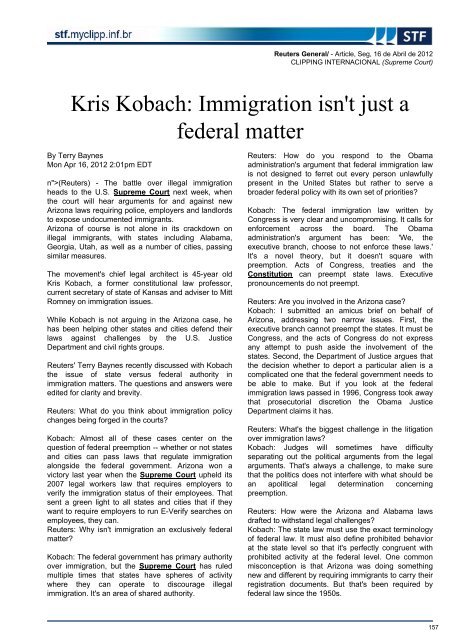STF na MÃdia - MyClipp
STF na MÃdia - MyClipp
STF na MÃdia - MyClipp
Create successful ePaper yourself
Turn your PDF publications into a flip-book with our unique Google optimized e-Paper software.
Reuters General/ - Article, Seg, 16 de Abril de 2012<br />
CLIPPING INTERNACIONAL (Supreme Court)<br />
Kris Kobach: Immigration isn't just a<br />
federal matter<br />
By Terry Baynes<br />
Mon Apr 16, 2012 2:01pm EDT<br />
n">(Reuters) - The battle over illegal immigration<br />
heads to the U.S. Supreme Court next week, when<br />
the court will hear arguments for and against new<br />
Arizo<strong>na</strong> laws requiring police, employers and landlords<br />
to expose undocumented immigrants.<br />
Arizo<strong>na</strong> of course is not alone in its crackdown on<br />
illegal immigrants, with states including Alabama,<br />
Georgia, Utah, as well as a number of cities, passing<br />
similar measures.<br />
The movement's chief legal architect is 45-year old<br />
Kris Kobach, a former constitutio<strong>na</strong>l law professor,<br />
current secretary of state of Kansas and adviser to Mitt<br />
Romney on immigration issues.<br />
While Kobach is not arguing in the Arizo<strong>na</strong> case, he<br />
has been helping other states and cities defend their<br />
laws against challenges by the U.S. Justice<br />
Department and civil rights groups.<br />
Reuters' Terry Baynes recently discussed with Kobach<br />
the issue of state versus federal authority in<br />
immigration matters. The questions and answers were<br />
edited for clarity and brevity.<br />
Reuters: What do you think about immigration policy<br />
changes being forged in the courts?<br />
Kobach: Almost all of these cases center on the<br />
question of federal preemption -- whether or not states<br />
and cities can pass laws that regulate immigration<br />
alongside the federal government. Arizo<strong>na</strong> won a<br />
victory last year when the Supreme Court upheld its<br />
2007 legal workers law that requires employers to<br />
verify the immigration status of their employees. That<br />
sent a green light to all states and cities that if they<br />
want to require employers to run E-Verify searches on<br />
employees, they can.<br />
Reuters: Why isn't immigration an exclusively federal<br />
matter?<br />
Kobach: The federal government has primary authority<br />
over immigration, but the Supreme Court has ruled<br />
multiple times that states have spheres of activity<br />
where they can operate to discourage illegal<br />
immigration. It's an area of shared authority.<br />
Reuters: How do you respond to the Obama<br />
administration's argument that federal immigration law<br />
is not designed to ferret out every person unlawfully<br />
present in the United States but rather to serve a<br />
broader federal policy with its own set of priorities?<br />
Kobach: The federal immigration law written by<br />
Congress is very clear and uncompromising. It calls for<br />
enforcement across the board. The Obama<br />
administration's argument has been: 'We, the<br />
executive branch, choose to not enforce these laws.'<br />
It's a novel theory, but it doesn't square with<br />
preemption. Acts of Congress, treaties and the<br />
Constitution can preempt state laws. Executive<br />
pronouncements do not preempt.<br />
Reuters: Are you involved in the Arizo<strong>na</strong> case?<br />
Kobach: I submitted an amicus brief on behalf of<br />
Arizo<strong>na</strong>, addressing two <strong>na</strong>rrow issues. First, the<br />
executive branch cannot preempt the states. It must be<br />
Congress, and the acts of Congress do not express<br />
any attempt to push aside the involvement of the<br />
states. Second, the Department of Justice argues that<br />
the decision whether to deport a particular alien is a<br />
complicated one that the federal government needs to<br />
be able to make. But if you look at the federal<br />
immigration laws passed in 1996, Congress took away<br />
that prosecutorial discretion the Obama Justice<br />
Department claims it has.<br />
Reuters: What's the biggest challenge in the litigation<br />
over immigration laws?<br />
Kobach: Judges will sometimes have difficulty<br />
separating out the political arguments from the legal<br />
arguments. That's always a challenge, to make sure<br />
that the politics does not interfere with what should be<br />
an apolitical legal determi<strong>na</strong>tion concerning<br />
preemption.<br />
Reuters: How were the Arizo<strong>na</strong> and Alabama laws<br />
drafted to withstand legal challenges?<br />
Kobach: The state law must use the exact terminology<br />
of federal law. It must also define prohibited behavior<br />
at the state level so that it's perfectly congruent with<br />
prohibited activity at the federal level. One common<br />
misconception is that Arizo<strong>na</strong> was doing something<br />
new and different by requiring immigrants to carry their<br />
registration documents. But that's been required by<br />
federal law since the 1950s.<br />
157











